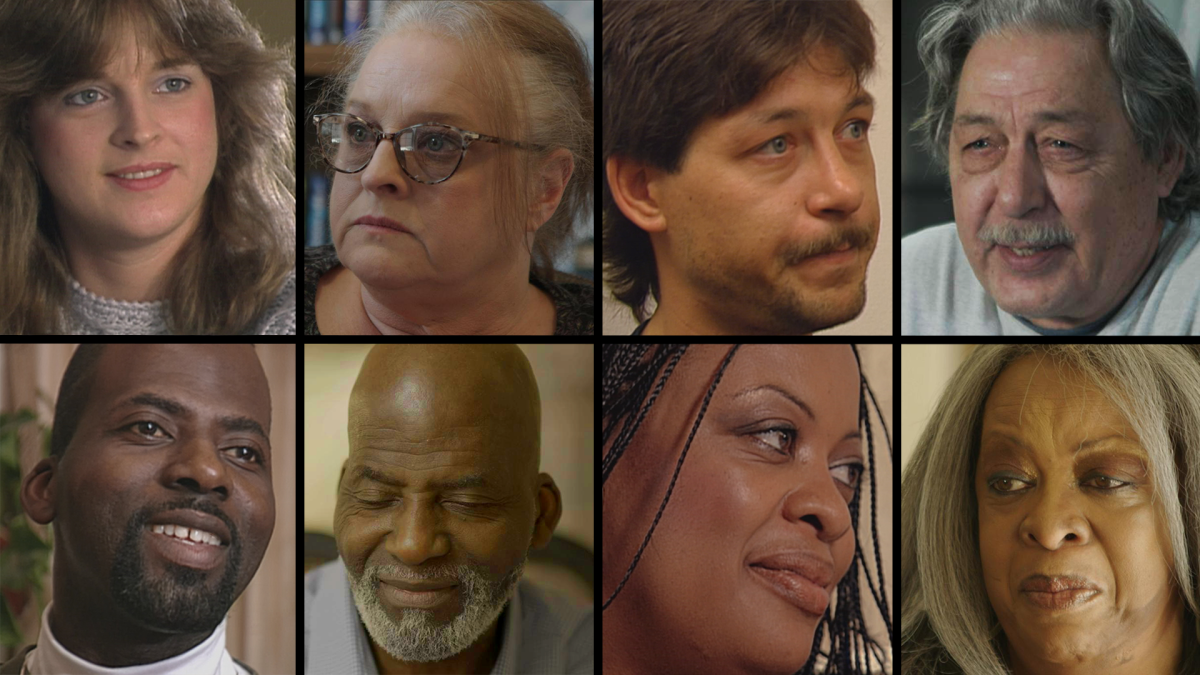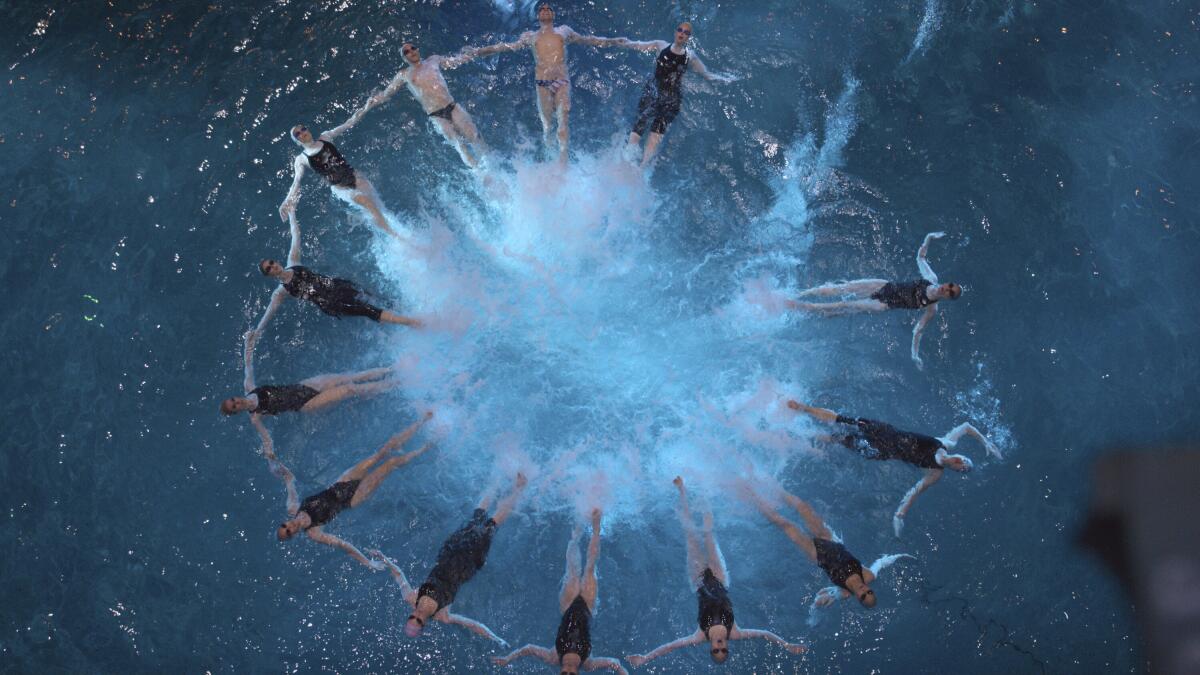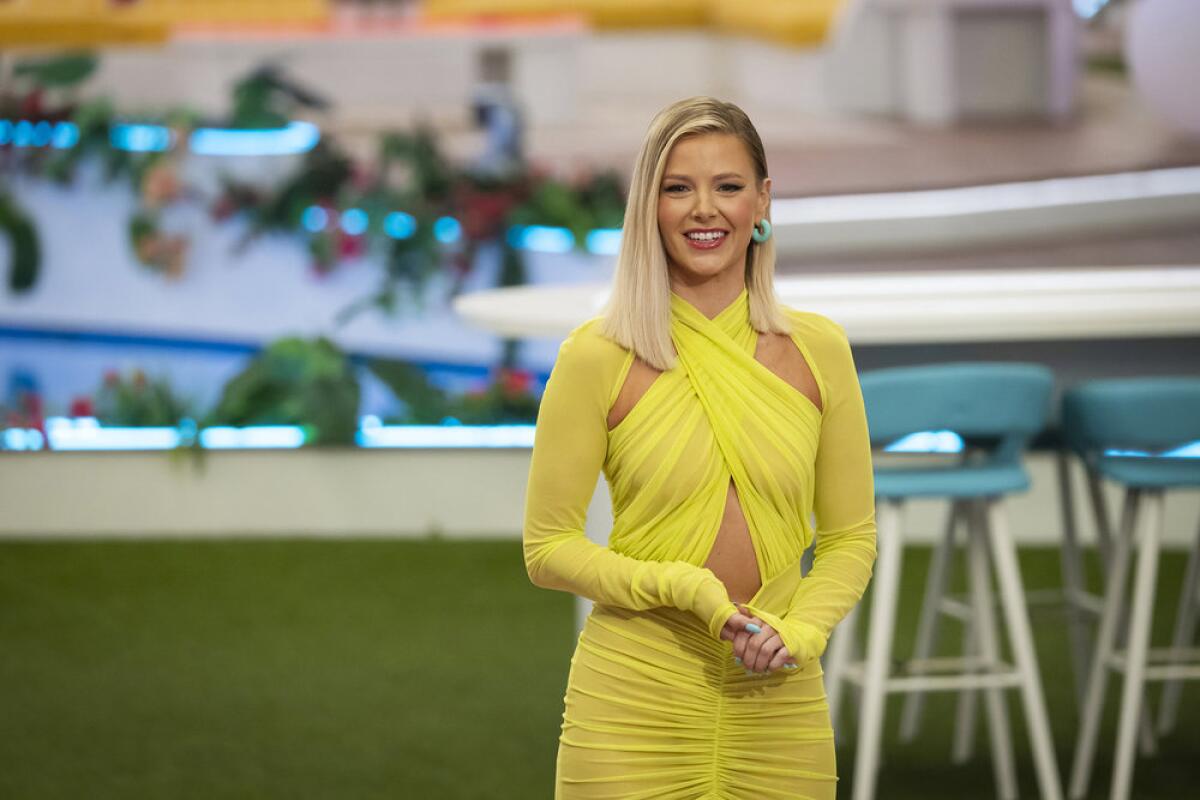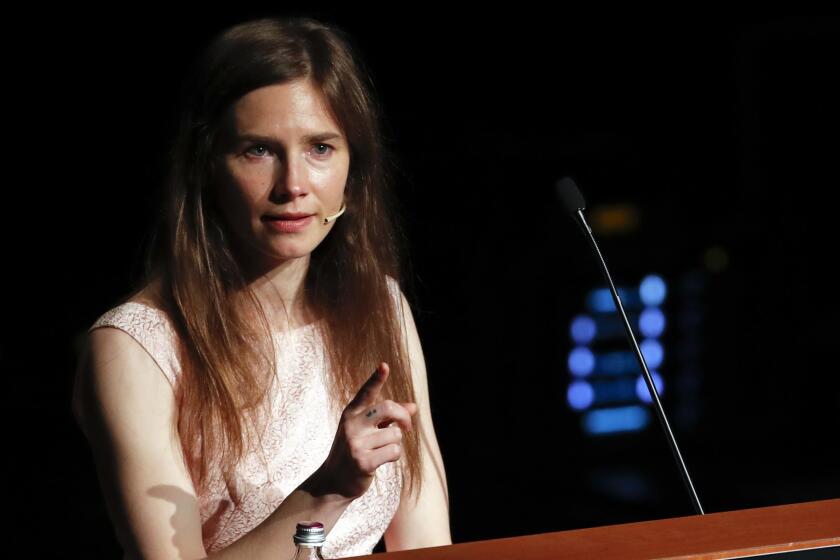How Peacock turned ‘Love Island USA’ into the summer’s must-see reality show

- Share via
Welcome to Screen Gab, the newsletter for everyone who’s feeling the heat right now.
Of “Love Island USA,” that is. Spun off from the U.K. original — which we broke down in exquisite detail in 2022 — the series has dominated the conversation among reality TV fans this summer like never before, and this week’s “Guest Spot” subject, podcaster Ben Mandelker, explains why.
Also in Screen Gab no. 141, our guide to the movies that inspired “Deadpool & Wolverine,” now in theaters, plus two streaming recommendations for your weekend.
You are reading Screen Gab newsletter
Sign up to get recommendations for the TV shows and streaming movies you can’t miss, plus exclusive interviews with the talent behind your favorite titles, in your inbox every Friday
You may occasionally receive promotional content from the Los Angeles Times.
ICYMI: The Summer Olympics
Must-read stories you might have missed

8 Olympics documentaries to watch before the Paris Games: To help you get ready for the games, The Times TV team compiled a list of Olympic-themed documentaries available to stream now.
2024 Paris Olympics: How to watch every event and the opening ceremony: Here’s how you can watch and stream any of 329 events at this summer’s games.
Whatever happens at the Olympics, Simone Biles has written a comeback story for the ages: In competitions, interviews and a new Netflix docuseries, Biles has shown that simply returning to the Olympics after her Tokyo “twisties” is a momentous achievement.
Snoop Dogg to blaze it up in Paris as a torchbearer for 2024 Olympics: ‘Gots to do it’: Snoop Dogg’s latest gig? Olympic torchbearer. The rapper will carry the torch as part of the Games’ opening ceremony Friday, a Paris-adjacent mayor announces.
Turn on
Recommendations from the film and TV experts at The Times

“Two American Families: 1991-2024” (PBS, YouTube)
Filmed over 34 years, this extraordinary “Frontline” documentary follows two working-class Milwaukee families — the Stanleys, who are Black, and the Neumanns, who are white — as they struggle to stay out of poverty and chase an increasingly elusive American Dream.
The saga begins in 1991, shortly after both families’ breadwinners were laid off from (relatively) well-paid manufacturing jobs. To make ends not-quite meet, the Stanleys and Neumanns turn to physically taxing non-union jobs that pay a fraction of what they once earned — with few benefits and unpredictable hours — and are forced to make excruciating choices. Filmmakers Tom Casciato and Kathleen Hughes and host Bill Moyers return to Milwaukee numerous times over the next three decades as the families white-knuckle their way through six presidential administrations and numerous cycles of economic boom and bust. Like the “Up” series, or Richard Linklater’s “Boyhood,” much of the film’s power accrues from the sheer passage of time, and the heartbreak of watching the Neumann and Stanley parents grow into old age while their families’ material conditions remain maddeningly unchanged.
Instead of clobbering viewers over the head with statistics or analysis, “Two American Families” takes an intimate, character-driven approach: You will care deeply about people like Jackie Stanley, who is always immaculately dressed in bargains from the thrift store because, she says, “You have to fake it ‘til you make it,” and Terry Neumann, who we meet as a fresh-faced young mom but who has become a great-grandmother with chronic aches and pains by the end of the film. You will come to admire their perseverance, even as you wish their grindingly hard work actually guaranteed some level of financial security. In the middle of another presidential election in which Wisconsin — and Rust Belt states like Michigan and Pennsylvania — is likely to be pivotal, “Two American Families” offers an unforgettable look at the individuals Washington policymakers tend to forget once the ballots have been cast. —Meredith Blake
READ MORE: ‘Two American Families’ is the saga of working class struggle and survival

“Cirque du Soleil: Without a Net” (Amazon Prime Video)
It’s been 25 years since “O” opened at Las Vegas’ Bellagio, and the water-based acrobatic spectacular still remains Cirque du Soleil’s most beloved — and profitable — production: 11,000 performances, 18 million-plus viewers and 90%-plus performance occupancy since opening. Dawn Porter’s documentary outlines the origins of the ambitious show and captures the company’s journey to resume performances after the pandemic by shadowing some of its immensely skilled contortionists, aerialists and artistic swimmers. The film also applauds the show’s astonishing sequences — triple-somersault dives off of Russian swings, partnered flying stunts atop a raised steel-frame ship — and the many, many people who collaborate onstage and behind the scenes to pull it all off every night, like the scuba divers who monitor the massive pool’s safety measures while coordinating the scene’s props, and the medics who stay ready in case anything goes wrong. —Ashley Lee
Catch up
Everything you need to know about the film or TV series everyone’s talking about

It’s been six long years since audiences last saw Ryan Reynolds as Deadpool on the big screen, but Marvel’s beloved antihero has returned in “Deadpool & Wolverine,” in theaters now. The film is a reunion of sorts: Reynolds’ first appearance as Wade Wilson (a.k.a. Deadpool) was in “X-Men Origins: Wolverine” (2009), starring Hugh Jackman as the gruff future X-Man. But without spoiling anything, “Deadpool & Wolverine” is also an homage to “Deadpool’s” roots as a franchise originally launched under Fox, which was acquired by Disney in 2019.
Jackman made his debut as Wolverine in Fox’s first Marvel superhero movie, “X-Men” (2000), which introduced the fan-favorite team of mutants led by Charles Xavier (Patrick Stewart). The original trilogy includes “X2” (2003) and “X-Men: The Last Stand” (2006). Wolverine’s popularity led to a trilogy of films centered on Jackman’s incarnation of the character, which includes the origin story “X-Men Origins”; “The Wolverine” (2013), which saw the character head to Japan after the events of “Last Stand”; and “Logan” (2017), about an older, more disillusioned Wolverine navigating a not-too-distant future when mutants have stopped being born.
The X-Men weren’t Fox’s only superhero team. The studio also released a series of films featuring Marvel’s First Family, the Fantastic Four. Unlike mutants, the members of the Fantastic Four developed superpowers after an experiment gone wrong. The original film series includes “Fantastic Four” (2005) and “Fantastic Four: Rise of the Silver Surfer” (2007). (Fox eventually rebooted both the “X-Men” and “Fantastic Four” series.)
For completists, Fox’s early wave of superhero films also include “Daredevil” (2003), which introduced the eponymous blind vigilante crime fighter, and its follow-up, “Elektra” (2005). Fox’s Marvel catalog, including “Deadpool” (2016) and “Deadpool 2” (2018), are available to stream on Disney+. (“X-Men: Origins,” “Elektra” and “Deadpool” are also on Max.) —Tracy Brown
Guest spot
A weekly chat with actors, writers, directors and more about what they’re working on — and what they’re watching

What reality TV fans affectionately call the Bravo-verse is not limited to “The Real Housewives” or “Below Deck.” As “Watch What Crappens” podcaster Ben Mandelker and co-host Ronnie Karam have both observed and experienced, the fandom has spawned a cottage industry of blogs, social media accounts, talk shows and more — all of which not infrequently end up shaping events on camera in turn. More than 10 years since it launched, the pair’s comedy podcast understands intuitively how many of us watch the network’s programming, relishing every minute but trying to keep at least a modicum of ironic distance from the ridiculousness, or toxicity, of it all. Mandelker stopped by Screen Gab recently to share his thoughts on how the genre has changed, the greatest “Housewives” season of all, and his pick for the reality show of the summer. —Matt Brennan
What’s the most underappreciated show or storyline in reality TV right now? What do you love about it and why do you think it’s flying under the radar?
“Love Island USA” has finally caught up and possibly surpassed its elder sibling, “Love Island UK.” For years, “USA” has languished — first at CBS, which was truly the worst home for it, and then on Peacock, where Sarah Hyland served as a perplexing and misguided choice for host.
Peacock did take things in the right direction by allowing uncensored language, but it wasn’t until Ariana Madix was air-dropped into the series that “Love Island USA” really found its groove, earning the title of the No. 1 reality show on streaming.
“Love Island USA” is clearly not flying under the radar this summer, but what is underappreciated is the role the Bravo fandom plays in its ascent.
Madix, who hails from “Vanderpump Rules,” has been a “Love Island” fan for years, and by cashing in on her Scandoval hotness, Peacock wisely tapped into the Bravo fandom. Suddenly Bravo content creators (including yours truly) have extended their coverage to “Love Island,” and as a result, the show has received an unprecedented amount of exposure. Bravo fans are a powerful force, and now that they’ve all caught the “Love Island” bug, they are driving the online conversation about the show. People are reaching out to me about “Love Island” who have never, ever watched the show. They once shrugged it off, and now they’re obsessed. I’m fielding emails and DMs about it every day. Even my “Love Island UK” loyalist friends have jumped ship to “USA” (unprecedented).
I hope network executives and producers have some takeaways about the show’s rampant popularity this summer. For one, it’s refreshing to watch a reality show aimed at adults that doesn’t shy away from uncensored language. We’re all above 13. We can handle the f-bombs. More importantly, “Love Island USA” puts forth a truly revolutionary concept that TV brass should observe: sometimes people chatting is enough.
The big twist about “Love Island” is that for all its tawdriness, it’s essentially a show about people sitting around talking — on beanbags, on benches, on puffy sofas under a sign that says “Soul Ties.” And the audience is eating it up! There are occasionally “challenges,” but they’re swift, silly and rare.
I contrast it to a show like “Big Brother,” which now pads out its episodes with cringe-worthy challenges that take up nearly 30 minutes of airtime. Or perhaps a better comparison is “The Traitors,” whose physical competition seems to exist solely because some executive fears that without a physical challenge, the audience will be bored. (The joke’s on them: No one likes the challenges). My dream of dreams — as it pertains to reality TV — is that other shows will follow Love Island’s lead and focus more on human interaction — and character building — than racing around obstacle courses.
You recently traveled to Europe for a series of live shows. What’s the biggest difference between Bravo fans abroad and Bravo fans in the U.S.?
I was struck by the universal appeal that the Bravo shows have. I thought maybe our jokes wouldn’t land as well with European audiences, or maybe our sensibilities might be out of whack. Nope. Everyone laughs at the same behavior, loves the same characters, and watches the same shows as rapidly as in the U.S.
How has the unscripted space changed most dramatically in the time that you’ve been doing the podcast, from your perspective?
There has been an ongoing conversation, especially post-2020, about what we do with these monsters we let onto our TVs. We want to laugh at bad behavior, but then we struggle with the ramifications of giving heinous people a platform. When we started in 2012, networks just kind of looked the other way. Now they are forced to face this — even if unsuccessfully.
Accountability in unscripted television speaks to the growing relationship between audience and network. The role of the audience has ballooned massively since we started podcasting about Bravo. We don’t just watch the shows. We comment. We write tweets. We make memes. We submit questions for reunions. We look up legal records. We snap photos in restaurants. And these things massively affect what happens on camera. It feels like we’re in dialogue with the shows.
There was a time when many of the unscripted series on Bravo were fly-on-the-wall content. A viewing audience was not acknowledged, and production sure as hell was never seen on camera. But now the fourth wall has eroded. We hear producers asking questions on air; camera operators slip into view; drama often stems directly from conversations about filming. Denise Richards famously declared “Bravo Bravo f— Bravo” because she’d been told the phrase would make her footage unusable … and Bravo aired it anyway! “Real Housewives of Salt Lake City” capped a triumphant Season 4 with the twist that its new cast member, Monica, was secretly an Instagram fan/troll who had badgered the cast for years.
In other words, these shows are meta now, and I think we’re seeing this across the genre as a whole. Audiences are more savvy than ever before, and unscripted shows need to give us peeks behind the curtain or else run the risk of playing their viewers as fools.
Gun to your head: What’s the greatest “Housewives” season of all time and why?
Season 8 of “Real Housewives of New York.” It’s a near-perfect cast at peak neuroses. The season has a chaotic and unbelievable through line: Countess Luann, single and lonely, moves into Sonja Morgan’s townhouse but then finds herself falling wildly in love with Sonja’s ex, Tom D’Agostino. Luann and Tom have a whirlwind romance, despite rumors of his infidelity, culminating in an engagement and then, of course, damning photos of him with another woman. Along the way, there is an epic meltdown in the Berkshires, a red carpet dry-cleaning party, and a much sought-after yacht. Nearly every episode is a masterclass in unscripted storytelling, and the whole season is an incredible showcase of the genre at its best.
The complete guide to home viewing
Get Screen Gab for everything about the TV shows and streaming movies everyone’s talking about.
You may occasionally receive promotional content from the Los Angeles Times.






